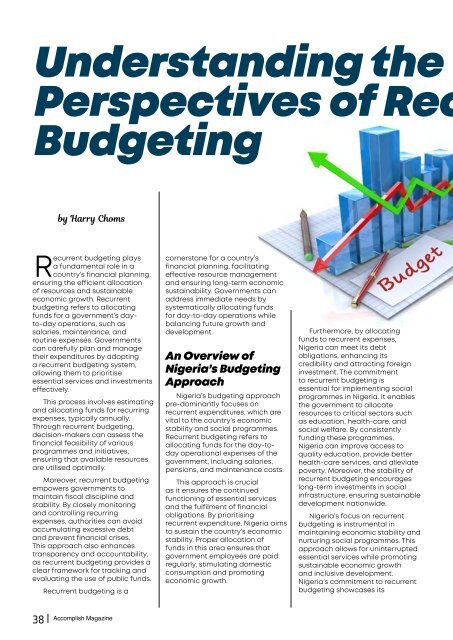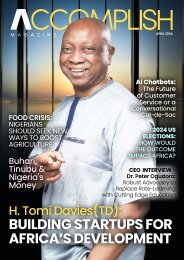ACCOMPLISH MAGAZINE OCT 2023
Aliko Dangote: The Strategist Behind West Africa’s Largest Industrial Conglomerate
Aliko Dangote: The Strategist Behind West Africa’s Largest Industrial Conglomerate
You also want an ePaper? Increase the reach of your titles
YUMPU automatically turns print PDFs into web optimized ePapers that Google loves.
Understanding the<br />
Perspectives of Rec<br />
Budgeting<br />
by Harry Choms<br />
Recurrent budgeting plays<br />
a fundamental role in a<br />
country’s financial planning,<br />
ensuring the efficient allocation<br />
of resources and sustainable<br />
economic growth. Recurrent<br />
budgeting refers to allocating<br />
funds for a government’s dayto-day<br />
operations, such as<br />
salaries, maintenance, and<br />
routine expenses. Governments<br />
can carefully plan and manage<br />
their expenditures by adopting<br />
a recurrent budgeting system,<br />
allowing them to prioritise<br />
essential services and investments<br />
effectively.<br />
This process involves estimating<br />
and allocating funds for recurring<br />
expenses, typically annually.<br />
Through recurrent budgeting,<br />
decision-makers can assess the<br />
financial feasibility of various<br />
programmes and initiatives,<br />
ensuring that available resources<br />
are utilised optimally.<br />
Moreover, recurrent budgeting<br />
empowers governments to<br />
maintain fiscal discipline and<br />
stability. By closely monitoring<br />
and controlling recurring<br />
expenses, authorities can avoid<br />
accumulating excessive debt<br />
and prevent financial crises.<br />
This approach also enhances<br />
transparency and accountability,<br />
as recurrent budgeting provides a<br />
clear framework for tracking and<br />
evaluating the use of public funds.<br />
Recurrent budgeting is a<br />
cornerstone for a country’s<br />
financial planning, facilitating<br />
effective resource management<br />
and ensuring long-term economic<br />
sustainability. Governments can<br />
address immediate needs by<br />
systematically allocating funds<br />
for day-to-day operations while<br />
balancing future growth and<br />
development.<br />
An Overview of<br />
Nigeria’s Budgeting<br />
Approach<br />
Nigeria’s budgeting approach<br />
pre-dominantly focuses on<br />
recurrent expenditures, which are<br />
vital to the country’s economic<br />
stability and social programmes.<br />
Recurrent budgeting refers to<br />
allocating funds for the day-today<br />
operational expenses of the<br />
government, including salaries,<br />
pensions, and maintenance costs.<br />
This approach is crucial<br />
as it ensures the continued<br />
functioning of essential services<br />
and the fulfilment of financial<br />
obligations. By prioritising<br />
recurrent expenditure, Nigeria aims<br />
to sustain the country’s economic<br />
stability. Proper allocation of<br />
funds in this area ensures that<br />
government employees are paid<br />
regularly, stimulating domestic<br />
consumption and promoting<br />
economic growth.<br />
Furthermore, by allocating<br />
funds to recurrent expenses,<br />
Nigeria can meet its debt<br />
obligations, enhancing its<br />
credibility and attracting foreign<br />
investment. The commitment<br />
to recurrent budgeting is<br />
essential for implementing social<br />
programmes in Nigeria. It enables<br />
the government to allocate<br />
resources to critical sectors such<br />
as education, health-care, and<br />
social welfare. By consistently<br />
funding these programmes,<br />
Nigeria can improve access to<br />
quality education, provide better<br />
health-care services, and alleviate<br />
poverty. Moreover, the stability of<br />
recurrent budgeting encourages<br />
long-term investments in social<br />
infrastructure, ensuring sustainable<br />
development nationwide.<br />
Nigeria’s focus on recurrent<br />
budgeting is instrumental in<br />
maintaining economic stability and<br />
nurturing social programmes. This<br />
approach allows for uninterrupted<br />
essential services while promoting<br />
sustainable economic growth<br />
and inclusive development.<br />
Nigeria’s commitment to recurrent<br />
budgeting showcases its<br />
38<br />
Accomplish Magazine

















